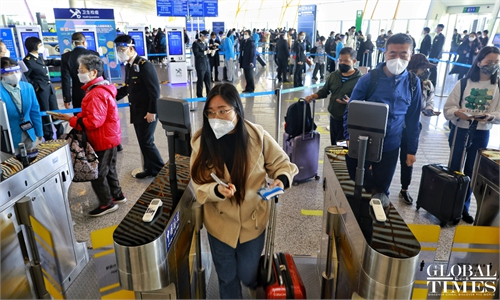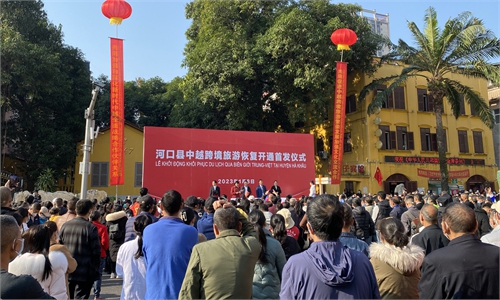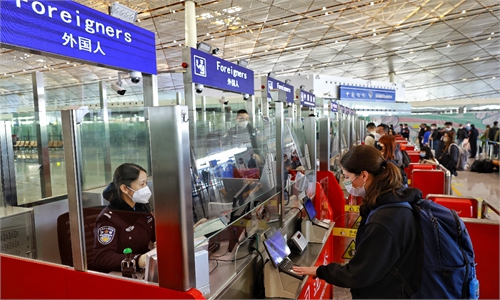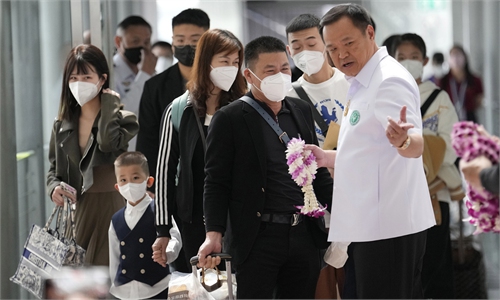GT on the spot: Bustling vibes gradually return to coronavirus-hit border city Ruili as life, industries begin a full recovery after reopening
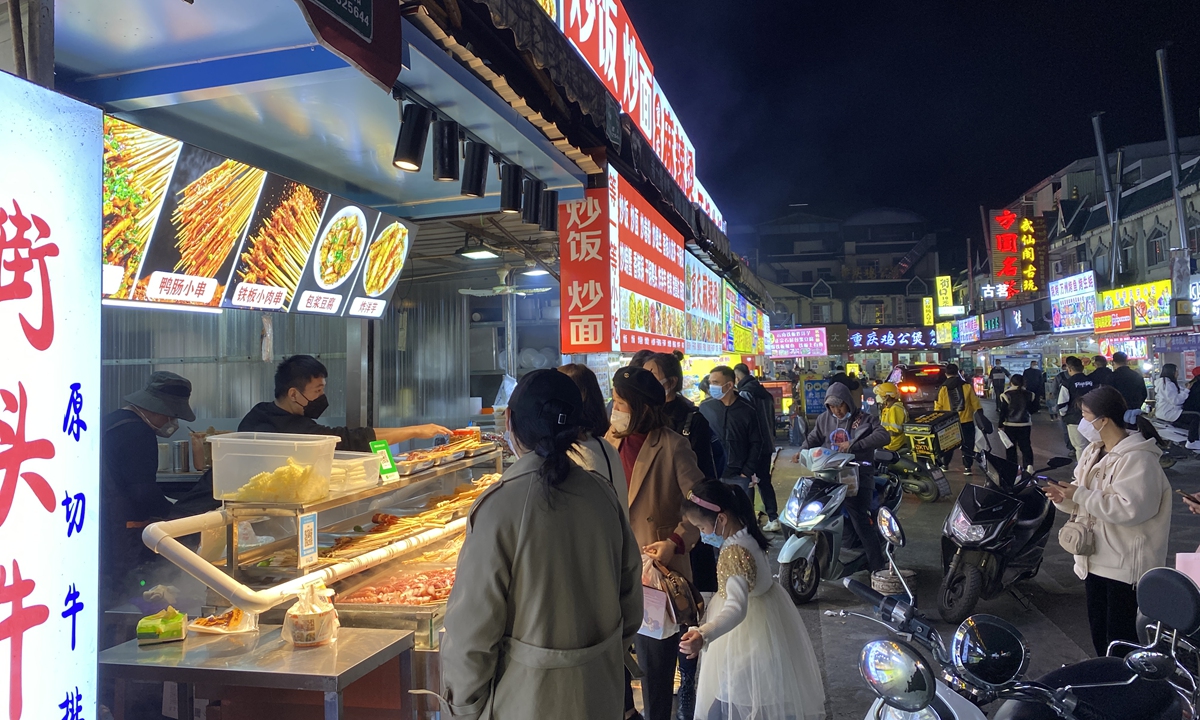
People throng the streets and nightmarkets of border city Ruili, Southwest China's Yunnan Province on January 10, 2023 as business and daily life resumes after China downgraded its COVID-19 management on January 8. Photos: Hu Yuwei/GT
The China-Myanmar border city of Ruili - one of the most stressed regions due to the imposition of strict epidemic prevention measures over the last three years - is gradually rebounding to vitality as the hustle and bustle of trade returned when China reopened its borders on Sunday after having downgraded its COVID-19 management.Due to the epidemic, interactions and commercial exchanges that made this city a booming region were suspended for three years, until the Jiegao border gate of Ruili port, the most important cross-border passenger channel, was restored to full operation after being closed for 1,012 days.
Midnight livestreaming of jade products, reopened street food stalls, industrial parks in full swing, and vendors and merchants returning, the signs of vitality are obvious. People in Ruili have successfully seen off the hardest days of the fight against the coronavirus, with strong hope for future prosperity after the epidemic.
As the city pushes the reset button, urban life and cross-border trade are sweeping away depression and economic downturn, showcasing its resilience to the world, in contradiction to the gloomy Western coverage that used Ruili as a target to attack China's anti-epidemic policies.
Start a full recovery with strong hope
Ruili port, the largest land port linking China and Myanmar, announced the border reopening on Sunday, after on-and-off, full or partial closures amid repeated outbreaks attributed partly to immigrants, some illegal, from neighboring Myanmar between 2020 and 2022.
Local officials told the Global Times that the Jiegao border gate has about 40,000 visits a day during normal operations. According to local government data, in the first half of 2019, Myanmar nationals accounted for 91.35 percent of the more than 8.35 million inbound and outbound travelers at the gate.
On Tuesday morning, many local citizens crowded the Jiegao border gate to take photos or livestream online, applauding the government's decision to remove the restrictions that were previously necessary to protect people's health and life, and expressing their wishes for a better, brighter Ruili than ever before.
Such joy and expectation was expressed through fireworks and a drone light show to celebrate the reopening in the border town several days ago, which expanded people's hopes for restored prosperity.
The shutters of shops along the street were pulled back, their seals ripped off, and there was a queue at the Myanmar food stall along the street when Global Times reporters visited.
A large jade mall posted a reopening notice, underlining its favorable policy of maintaining a rent reduction for store tenants, which said, "Thank you for not leaving us."
The livestreaming craze has brought luster back to the city, which is famous for its jade industry. Livestream jade products sales were very busy at midnight when Global Times reporters visited a large jade trading market. Many business owners had posted job ads on the wall.
"I thought it would take longer for vendors to come back, but unexpectedly we have more than 100 vendors now, just two months after we reopened, and I believe there will be more after the Spring Festival holidays," said Cai Xin, a manager of the market. Most jade trade fairs in the city have been cheerless for long periods over the past three years as imports of jade from Myanmar were suspended.
Most jade trade fairs in the city have been cheerless for long periods over the past three years as imports of jade from Myanmar were suspended.
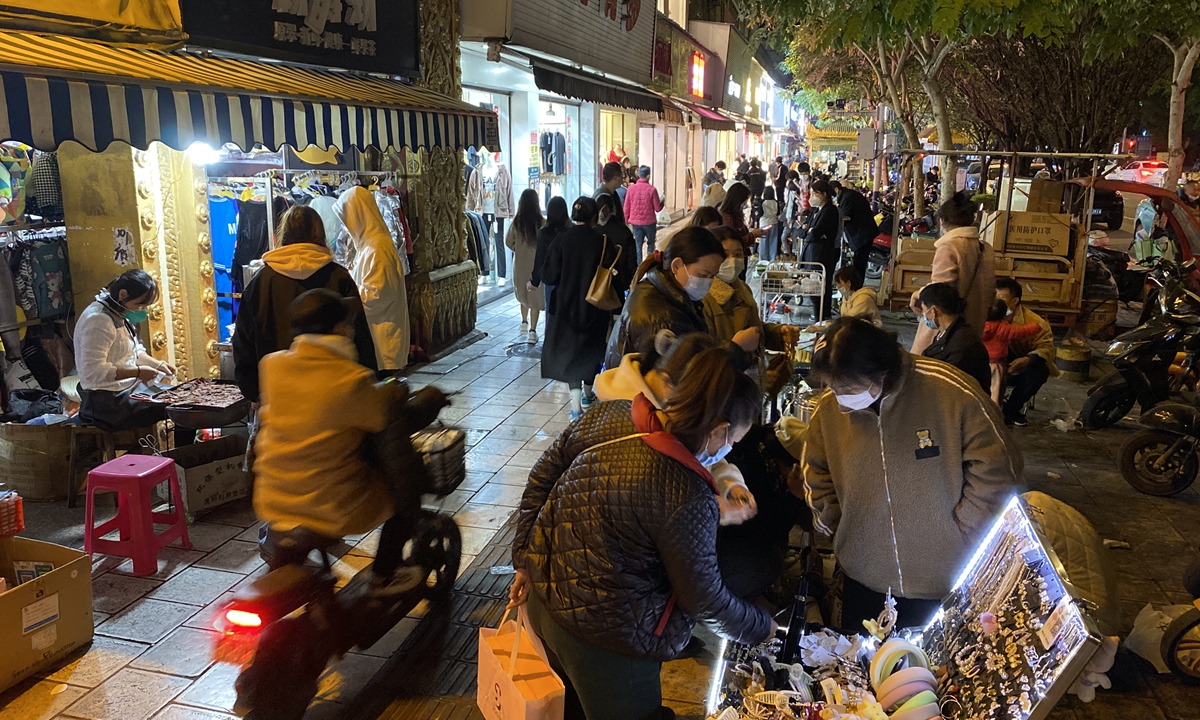
People throng the streets and nightmarkets of border city Ruili, Southwest China's Yunnan Province on January 10, 2023 as business and daily life resumes after China downgraded its COVID-19 management on January 8. Photos: Hu Yuwei/GT
The Global Times learned from the local government that great efforts and favorable measures are underway to attract businesspeople to return to the border city, such as giving the green light to qualification approval procedures for both Myanmar and domestic merchants.Cai said the hard-hit jewelry industry in past three years has forced many merchants to seek opportunities elsewhere. But now, with the reopening, many decided to return, believing the city, which is very close to Myanmar, is the most ideal venue for the jade trade and that it would see a future surge in traffic.
Zin Myo Thu, a popular livestreamer from Myanmar, is one of those who sticks to Ruili, after not heeding his mother's calls to return to Myanmar during the frequent COVID-19 outbreaks in Ruili.
He regards Ruili as his second hometown that gives him the fortune to earn a competitive salary, which is the envy of many of his fellow Myanmar compatriots.
"I believe the reopening will bring an explosion in the jade market because Ruili and Myanmar are closely interdependent in the jewelry industry. Many young people from Myanmar are eager to come to China to seek more opportunities," he told the Global Times on Tuesday.
As reported by local media in November 2020, the number of Myanmar nationals working in Ruili all year round had reached at least 100,000.
Chen Feng, deputy general manager of a newly opened duty-free shop, decided to move his business with his team from South China to Ruili in December 2022 with practical policy supports from the local government.
He told the Global Times that he is one of the first of those expected to rush back to Ruili, as the city attracts businesspeople seeking a future boom in cross-border trade.
Accusations blinding real efforts
The recovery did not happen overnight. Most residents believed that it would take much longer to fully recover its prosperity to the pre-epidemic level. The Global Times reporters observed that some shops on the streets are still closed.
People are still preparing to open a new chapter and put the difficult days behind them, residents say.
Ruili had a population of nearly half a million at its peak, and about 300,000 are still there today, a local official told the Global Times. This fact is far from what some Western media hyped that Ruili had lost two-thirds of its population during the epidemic control. Yet, three years of fighting the epidemic is an unforgettable memory for everyone in Ruili.
The complex border control situation, a 169-kilometer-long borderline, conflicts in Myanmar and the highly contagious Delta variant had put Ruili at high risks and at the forefront of epidemic prevention as well as border control.
The unique and complicated situation required strict epidemic prevention measures in Ruili, which successfully ensured cases did not spread to other provinces and regions, and the city guarded the border for both countries.
Local residents have suffered from a challenging life, but the Ruili government managed to meet residents' needs, from giving subsidies for villagers in lockdown to providing daily necessities for residents and psychological counseling for residents suffering psychological stress.
Exhausted border control staff, joined by a large number of civil servants coming from neighboring regions to assist, had to work day and night to prevent transnational crimes such as illegal border-crossings.
Experts said that no other province has faced such a grim condition in border control.
To save the local economy, in mid-2022 Ruili government organized a team to go to southern Chinese cities to persuade and encourage some jade traders who had left Ruili to return and strive for future opportunities, local officials told the Global Times.
However, some Western media, while turning a blind eye to the complicated situation and all the efforts the local governments had made in Ruili, have exaggerated the epidemic crisis in Ruili through sensational reporting of extreme tragic cases.
Foreign media sniping remains unchanged after China optimized its policy and downgraded measures.
Some French media, for example, said that Ruili "is still numb from three years of trauma" in a recent piece, turning a blind eye to the evident signs of recovery.
It is true that Ruili had pressed the "pause button" a dozen times over the last three years, but now Ruili is open to visitors from all over the world and is bursting with hope for a new life.
"Ruili built iron fences along the border, preventing stowaways and earning valuable time for the inner lands to deal with the mutated strains. The efforts of all the people here in this hero border city should be recognized and respected," a local resident surnamed Lin told the Global Times.


